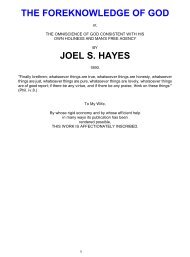Are Men Born Sinners? - Library of Theology
Are Men Born Sinners? - Library of Theology
Are Men Born Sinners? - Library of Theology
Create successful ePaper yourself
Turn your PDF publications into a flip-book with our unique Google optimized e-Paper software.
12-21. This passage has been usually regarded as the most difficult part <strong>of</strong> the New<br />
Testament. It is not the design <strong>of</strong> these Notes to enter into a minute criticism <strong>of</strong> contested<br />
points like this. They who wish to see a full discussion <strong>of</strong> the passage, may find it in the<br />
pr<strong>of</strong>essedly critical commentaries; and especially in the commentaries <strong>of</strong> Tholuck and <strong>of</strong><br />
Pr<strong>of</strong>essor Stuart on the Romans. The meaning <strong>of</strong> the passage in its general bearing is not<br />
difficult; and probably the whole passage would have been found far less difficult if it<br />
had not been attached to a philosophical theory on the subject <strong>of</strong> man's sin, and if a<br />
strenuous and indefatigable effort had not been made to prove that it teaches what it was<br />
never designed to teach.<br />
19. For, &c. This verse is not a mere repetition <strong>of</strong> the former, but it is an explanation. By<br />
the former statements it might perhaps be inferred that men were condemned without any<br />
guilt or blame <strong>of</strong> theirs. The apostle in this verse guards against this, and affirms that they<br />
are in fact sinners. He affirms that those who are sinners are condemned, and that the<br />
sufferings brought in on account <strong>of</strong> the sin <strong>of</strong> Adam, are introduced because many were<br />
made sinners. Calvin says, "Lest any one should arrogate to himself innocence, [the<br />
apostle] adds, that each one is condemned because he is a sinner."<br />
By one man's disobedience. By means <strong>of</strong> the sin <strong>of</strong> Adam. This affirms simply the fact<br />
that such a result followed from the sin <strong>of</strong> Adam. The word by (dia) is used in the<br />
Scriptures as it is in all books and in all languages. It may denote the efficient cause; the<br />
instrumental cause; the principal cause; the meritorious cause; or the chief occasion by<br />
which a thing occurred. (See Schleusner.) It does not express one mode, and one only, in<br />
which a thing is done; but that one thing is the result <strong>of</strong> another. When we say that a<br />
young man is ruined in his character by another, we do not express the mode, but the fact.<br />
When we say that thousands have been made infidels by the writings <strong>of</strong> Paine and<br />
Voltaire, we make no affirmation about the mode, but about the fact. In each <strong>of</strong> these, and<br />
in all other cases, we should deem it most inconclusive reasoning to attempt to determine<br />
the mode by the preposition by; and still more absurd if it were argued from the use <strong>of</strong><br />
that preposition that the sins <strong>of</strong> the seducer were imputed to the young man; or the<br />
opinions <strong>of</strong> Paine and Voltaire imputed to infidels.<br />
There is not the slightest intimation that it was by imputation. The whole scope <strong>of</strong> the<br />
argument is, moreover, against this; for the object <strong>of</strong> the apostle is not to show that they<br />
were charged with the sin <strong>of</strong> another, but that they were in fact sinners themselves. If it<br />
means that they were condemned for his act, without any concurrence <strong>of</strong> their own will,<br />
then the correspondent part will be true, that all are constituted righteous in the same<br />
way; and thus the doctrine <strong>of</strong> universal salvation will be inevitable. But as none are<br />
constituted righteous who do not voluntarily avail themselves <strong>of</strong> the provisions <strong>of</strong> mercy,<br />
so it follows that those who are condemned, are not condemned for the sin <strong>of</strong> another<br />
without their own concurrence, nor unless they personally deserve it.<br />
<strong>Sinners</strong>. Transgressors; those who deserve to be punished. It does not mean those who are<br />
condemned for the sin <strong>of</strong> another; but those who are violators <strong>of</strong> the law <strong>of</strong> God. All who<br />
are condemned are sinners. They are not innocent persons condemned for the crime <strong>of</strong><br />
another. <strong>Men</strong> may be involved in the consequences <strong>of</strong> the sins <strong>of</strong> others without being to






